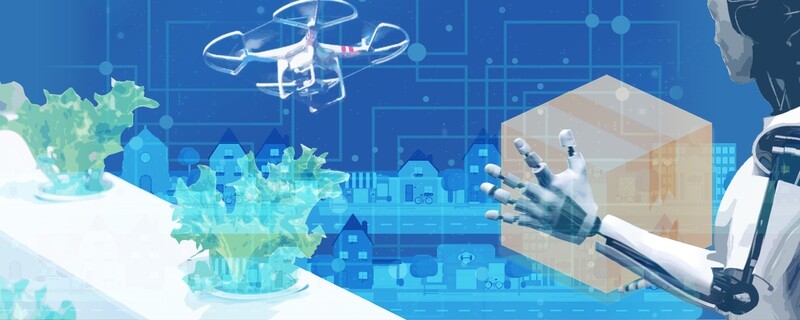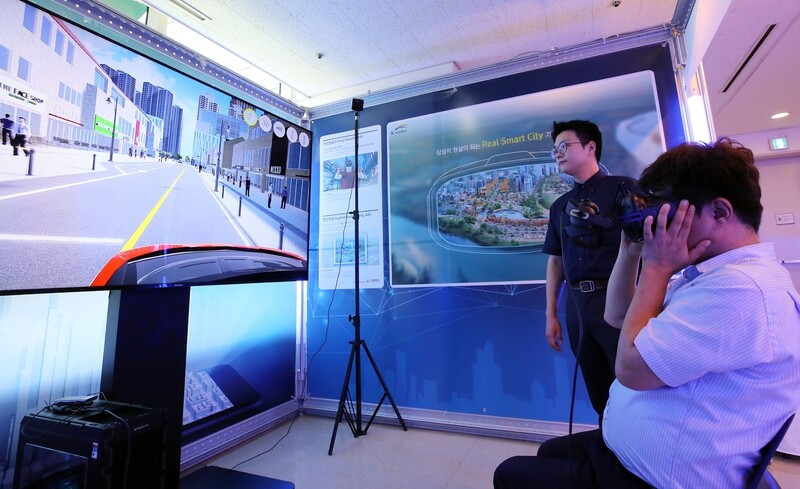hankyoreh
Links to other country sites 다른 나라 사이트 링크
Government project envisions smart city with no cars, medical drones, and free electricity

“A city with no cars driving on the roads and with emergency medical services delivered by drones. A city where mineral water flows from the taps and electricity doesn’t cost families a single cent.”
Could such a city be possible?
On the afternoon of July 16, the Presidential Committee on the Fourth Industrial Revolution announced the rough sketch of Sejong 5-1 Life Zone and the Busan Eco Delta City at DMC Hi-Tech Industry Center, located in Seoul’s Sangam neighborhood. The two cities are test beds for the smart city project that the South Korean government has been energetically promoting.
This smart city trial project has received considerable attention from the outset because of the appointment of two figures who are not specialists in urban planning as the smart cities’ master planners: Jeong Jae-seung, a professor of bio and brain engineering at the Korea Advanced Institute of Science and Technology (KAIST), for Sejong’s Life Zone, and Chun Jae-won, CEO of XNtree, for Busan’s Eco Delta City.

The keywords for the rough sketch of the smart cities that the two master planners released on Monday were technological and civic participation and relaxing regulations. First of all, the plan for Sejong is based on the concept of “shared mobility”: personal vehicles will be parked at the entrance to the city and transportation inside the city will be provided through self-driving cars, shared vehicles and bicycles.
Congestion on the roads will be eliminated by data analysis of the flow of traffic powered by artificial intelligence and based on next-generation 5G mobile communications. Drones and robots will be used to deliver packages and provide medical service. Produce will be grown on urban smart farms inside the city and then delivered to residents.
“The appearance of the smart city will be modeled not on Gangnam, with its high-rises, but on Bukchon, Seochon and Yeonnam,” Jeong said, referring to Seoul neighborhoods often regarded as preserving a more authentic and traditional identity.
The goal of the Busan smart city is installing small-scale water purification facilities close to consumers to provide water of a quality comparable to the bottled variety and providing households with free electricity through eco-friendly energy. One example of this is hydrothermal energy, which uses streams and rivers to convert the temperature difference between the water and air into heat.
Smart democracy
The rough sketch emphasizes civic participation through the creation of a “living lab” in which citizens and users are the direct agents of innovation. Sejong has the ambition of achieving representative democracy through civic councils and using smartphone apps to hold public opinion polls and field complaints. Busan will also be operating “Smart City No. 1,” which will let both civilian experts and ordinary people participate in the entire process, while also creating an environment for civic-led innovation.
Both of the master planners stressed relaxing regulations. The smart cities should serve as “regulatory sandboxes” and “tech sandboxes” that can test out the technologies related to the Fourth Industrial Revolution that regulations have prevented from being effectively demonstrated, the master planners said. The plan for Sejong is to secure long-term, focused data from 200,000-300,000 residents and provide them with services based on analysis of this data, while Busan has decided to operate a “data market” that will accumulate and share the data needed by private companies. This will require relaxing regulations about protecting individual data.
In fact, a revised version of the Act on Creating Smart Cities and Promoting Industry that is backed by the government and the ruling party has currently passed the relevant committee in the National Assembly. The proposed revision would make it possible for private information that has been “deidentified” to be used or provided to third parties even without the consent of the individuals concerned, provided that the use has been deemed appropriate by a certifying body designated by the Ministry of Land, Infrastructure and Transport and the Ministry of the Interior and Safety.
Jeong acknowledged that there were concerns that personal information could be violated during the process of data usage: “There are concerns even with deidentified information, since [individuals] can be reidentified. But since the use of blockchain technology would make forgery and manipulation impossible and enable tracking, I think [the concerns about violating private information] can be mitigated.”
Now that the basic plan for the smart city trial project has been announced, the specific implementation plan is expected to be adopted in December, after soliciting more opinions and discussing ways to involve companies in the private sector. The implementation plan will include a land usage plan as well as plans outlining the roles of the public and private sectors and allotting responsibility for funding. The goal is for design and construction on the smart cities to begin in the first half of next year and for residents to actually move into them in 2021. Construction at Sejong will be overseen by the Korea Land and Housing Corporation, and construction at Busan will be handled by the Korea Water Resources Corporation.
By Park Tae-woo, staff reporter
Please direct comments or questions to [english@hani.co.kr]

Editorial・opinion
![[Guest essay] The real reason Korea’s new right wants to dub Rhee a founding father [Guest essay] The real reason Korea’s new right wants to dub Rhee a founding father](https://flexible.img.hani.co.kr/flexible/normal/500/300/imgdb/original/2024/0423/8317138574257878.jpg) [Guest essay] The real reason Korea’s new right wants to dub Rhee a founding father
[Guest essay] The real reason Korea’s new right wants to dub Rhee a founding father![[Column] ‘Choson’: Is it time we start referring to N. Korea in its own terms? [Column] ‘Choson’: Is it time we start referring to N. Korea in its own terms?](https://flexible.img.hani.co.kr/flexible/normal/500/300/imgdb/original/2024/0423/3617138579390322.jpg) [Column] ‘Choson’: Is it time we start referring to N. Korea in its own terms?
[Column] ‘Choson’: Is it time we start referring to N. Korea in its own terms?- [Editorial] Japan’s rewriting of history with Korea has gone too far
- [Column] The president’s questionable capacity for dialogue
- [Column] Are chaebol firms just pizza pies for families to divvy up as they please?
- [Column] Has Korea, too, crossed the Rubicon on China?
- [Correspondent’s column] In Japan’s alliance with US, echoes of its past alliances with UK
- [Editorial] Does Yoon think the Korean public is wrong?
- [Editorial] As it bolsters its alliance with US, Japan must be accountable for past
- [Guest essay] Amending the Constitution is Yoon’s key to leaving office in public’s good graces
Most viewed articles
- 1[Column] ‘Choson’: Is it time we start referring to N. Korea in its own terms?
- 2Why Korea shouldn’t welcome Japan’s newly beefed up defense cooperation with US
- 3Senior doctors cut hours, prepare to resign as government refuses to scrap medical reform plan
- 4[Guest essay] The real reason Korea’s new right wants to dub Rhee a founding father
- 5Opposition calls Yoon’s chief of staff appointment a ‘slap in the face’
- 6[Column] The clock is ticking for Korea’s first lady
- 7Terry Anderson, AP reporter who informed world of massacre in Gwangju, dies at 76
- 8New AI-based translation tools make their way into everyday life in Korea
- 9Samsung barricades office as unionized workers strike for better conditions
- 10Korea ranks among 10 countries going backward on coal power, report shows